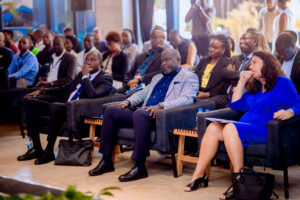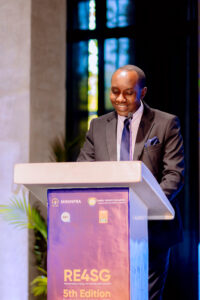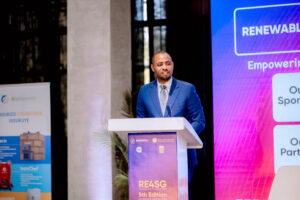By Jean Baptiste Ndabananiye.

Kigali hosts Energy Week 2025 amid growing urgency to meet Rwanda’s ambitious energy goals. With the country striving for universal electricity access, reduced greenhouse gas emissions, and greater reliance on renewable energy by 2030, this annual gathering brings together innovators, policymakers, and investors to accelerate progress and explore solutions for Africa’s energy future.
Energy Week 2025 opened today in Kigali with a renewed sense of urgency and commitment. As Rwanda edges closer to 2030 — the year it has vowed to accomplish universal electricity access, reduce greenhouse gas emissions by 38%, source at least 60% of its energy from renewable sources, and decrease wood fuel dependency from nearly 79% of households to 42% — the urgency is greater than ever. These are not distant policy markers, but concrete targets with profound implications for millions of Rwandans.
Several African nations still lag behind in electricity access, with countries like Malawi and Zambia far below Rwanda’s coverage levels. Energy Week 2025 highlights the urgent need for cross-border collaboration and knowledge sharing to help these nations accelerate their progress toward universal electrification. In fact, the responsibility is profound. The task ahead is monumental, the pressure to deliver is real and pressing.
Innovation and collaboration for Africa’s energy future
The gathering, convened by Energy Private Developers (EPD) in partnership with government and global stakeholders, constitutes more than a showcase of innovations. It forms a test of whether Africa, and Rwanda in particular, can accelerate from bold policy ambitions to practical, scalable, and affordable solutions. At the heart of the discussions lies a central question: how to balance accessibility, affordability, and sustainability.
By bringing together leaders, innovators, and investors, Energy Week 2025 positions Rwanda not only as a national actor but also as a continental hub in shaping Africa’s energy future. The conversations launched today reaffirm that energy is not merely an infrastructure concern — it acts as the foundation for health, prosperity, and sustainable development across the continent.
Anita Umutoniwase, Founder and Managing Director of Eco Green Solutions Ltd, says “This event is important for me because I am learning from my colleagues from different countries and even Rwanda. For example, owing to the exhibition, I have observed what others produce, innovations and skills that they possess so that it has been a great learning experience for me. It has enabled me to realize what I can add to what I am creating.
Besides, there are different stakeholders, we have met, who are likely to work with us in the future. To me, this gathering also constitutes a valuable networking platform, but again learning from others outweighs all other benefits. When you listen to other people’s testimonies, challenges that they encounter; all this helps you. When you experience such an issue, you will remember ‘The person has faced a similar and has handled it in this way; I am also going to deal with it and persevere in my work.”

Her perspective reflects the personal growth and collaboration opportunities that the Energy Week creates for entrepreneurs and innovators. At the same time, organizers stress that the event is not only about individual benefits but also about advancing a shared continental vision. EPD Chief Executive Officer, Serge Wilson Muhizi, explains it, starting with the uniqueness of this event. “The uniqueness of the 2025 Energy Week is that it has expanded to include other energy stakeholders across Africa. In the past four editions, our discussions were confined to Rwanda.
But we have now elevated it to the level of Africa so that we can discuss issues affecting the continent as a whole. There is an ambition to provide electricity for 300 million people in Africa by 2030, in response to more than 600 million Africans who still lack access to electricity today. The ambition is what has been dubbed ‘Mission 300’. But in Rwanda, we have actually advanced in this field. There is a colleague in Malawi who has shared with us that they stand at 25% of electricity coverage, in Zambia and in various nations of Africa, they are at lower levels.”
According to REG, as of end February 2025, the cumulative connectivity rate in Rwanda is a bit more than 82 of Rwandan households including “57.4% connected to the national grid and 24.8% accessing through off-grid systems (mainly solar).” Muhizi builds on this achievement to underscore an area that, as Umutoniwase has noted, ranks first: learning from one another. He says “ With regard to Mission 300, that’s why you have seen people from Malawi, Zambia, Nigeria, and other various countries.
We have extended the event to involve our counterparts from East Africa, and other parts of Africa, for us to discuss ‘What can I learn from you, and what can you learn from me? As a result, there are partners— with whom we are working or entrepreneurs— who wish to go to help Malawi, so that she can also rise to Rwanda’s current degree of electricity coverage. In this regard, we won’t be worried, when our companies want to expand there, they won’t struggle since we have already established collaboration with the Malawian peers.”
Learning re-emphasized by the State Minister

The reflections of entrepreneurs like Umutoniwase and insights from Muhizi underline the spirit of collaboration and learning that defines this year’s Energy Week. That same spirit was echoed at the official opening by the Minister of State for Infrastructure, Ambassador Jean de Dieu Uwihanganye, who emphasized the event’s broader purpose, while officially opening it. “Today marks the launch of Energy Week, a platform that brings together key partners—from the private sector to development agencies—to collaborate on advancing the energy sector. This gathering offers a unique opportunity for participants to explore, learn, and engage with state-of-the-art technologies, fostering knowledge exchange and innovation. Together, we aim to strengthen cooperation and accelerate progress toward the energy goals we have set for ourselves.
The government of Rwanda remains committed to working with you. Thank you for creating such an impactful gathering, I wish you a successful and fruitful engagement. ”
Around 12 countries— such as Malawi, Zambi, Nigeria, China, Netherlands and the Democratic Republic of Congo— are represented in the Energy Week. More than 30 companies exceed are also attending it.
For the background of the event, you can open this story where you will find questions to which we will come back, such as the contribution of this event to helping Rwanda to achieve its target of 100% universal electrification by 2030.